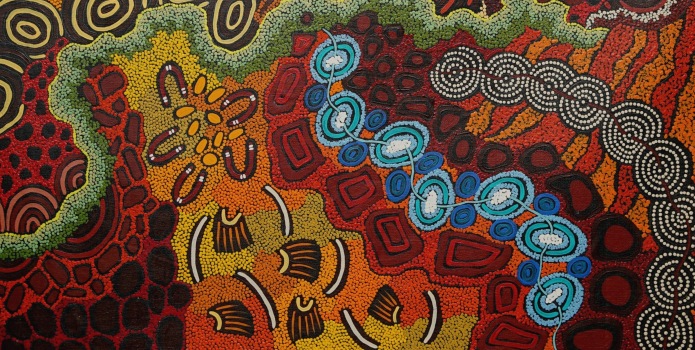More and more, it seems clear that human thought naturally organizes itself along patterns of narrative.
 Story is how we process and understand our world, then encode that information to pass along to others. There is an argument that information passed down through aboriginal Australian songs may encode verifiable geological events from 8,000 years ago. Their visual art tradition appears to do something similar. And--at its best--what is the Judeo-Christian bible if not distilled wisdom about how to be a human from about 10,000 years ago to 100 a.d.?
Story is how we process and understand our world, then encode that information to pass along to others. There is an argument that information passed down through aboriginal Australian songs may encode verifiable geological events from 8,000 years ago. Their visual art tradition appears to do something similar. And--at its best--what is the Judeo-Christian bible if not distilled wisdom about how to be a human from about 10,000 years ago to 100 a.d.?
Business theory accepts this idea. The "knowledge transfer cycle" states that:
More recently, story narrative has been getting attention from science.
So what does that mean to FSMLs? Only that if we are not creating our own narrative, someone else will do it for us (and we may not be happy with the results). Understanding narrative may be a scientific process, but creating it is not: it is an artistic one.
 Story is how we process and understand our world, then encode that information to pass along to others. There is an argument that information passed down through aboriginal Australian songs may encode verifiable geological events from 8,000 years ago. Their visual art tradition appears to do something similar. And--at its best--what is the Judeo-Christian bible if not distilled wisdom about how to be a human from about 10,000 years ago to 100 a.d.?
Story is how we process and understand our world, then encode that information to pass along to others. There is an argument that information passed down through aboriginal Australian songs may encode verifiable geological events from 8,000 years ago. Their visual art tradition appears to do something similar. And--at its best--what is the Judeo-Christian bible if not distilled wisdom about how to be a human from about 10,000 years ago to 100 a.d.?Business theory accepts this idea. The "knowledge transfer cycle" states that:
"Knowledge can be stored in databases, documentation, process tables, decision trees, wikis and quick reference guides. But one of the most powerful ways to store knowledge is through stories. Much knowledge, especially tacit knowledge, exists in the minds of the experts and can be made accessible through mentoring or through connections using social media tools."In the 1960's, Philosopher Roland Barthes worked to understand in narrative, "a principle of classification and a basis of description," pointing out that "there is a deep gulf between the most complex product of chance, and the most simple conscious construction..." He looked for the rules governing narrative construction in narrative itself: all narrative.
More recently, story narrative has been getting attention from science.
"...mathematicians at the University of Vermont have now looked at more than 1,000 texts to see if they could automatically extract their emotional arcs. And their results show something interesting, not just about narratives, but also about using this approach to study literature."Using digitized texts from Project Gutenberg, the study found 6 consistent patterns of story. And--startlingly--these patterns hold not just in fiction but in non-fiction as well. We impose these patterns on all communication.
So what does that mean to FSMLs? Only that if we are not creating our own narrative, someone else will do it for us (and we may not be happy with the results). Understanding narrative may be a scientific process, but creating it is not: it is an artistic one.

No comments:
Post a Comment